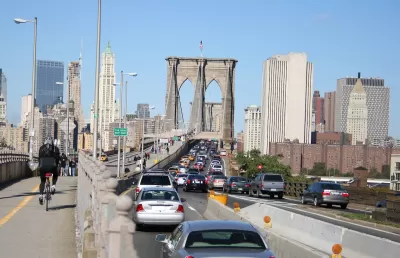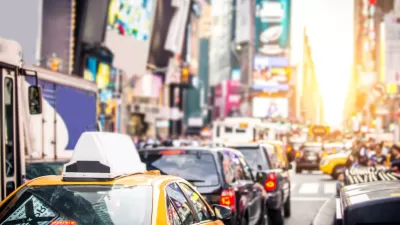Gov. Hochul’s surprise move to suspend the program, which would have started this summer, could be illegal.

New York Governor Kathy Hochul’s announcement that New York City’s congestion pricing program will not go forward as planned came as a shock to many, and now some critics of the move say it could be illegal.
But, as David Meyer explains in Streetsblog NYC, the governor could successfully put an end to the program because the Federal Highway Administration has yet to take a key step: signing a formal agreement with the MTA and city and state departments of transportation.
Nonetheless, the 2019 law that established congestion pricing said the state and MTA ‘shall’ implement tolls to enter Manhattan below 60th Street. Observers including U.S. Rep. Ritchie Torres and the Daily News Editorial Board argue that that language — not ‘may’ or ‘can,’ but ‘shall’ — compels Hochul and the MTA to enact the tolls.
According to Meyer, “Several constituencies could sue under Article 78 of state Civil Practice Law, which requires state or city officials to comply with their legal obligations under state law, but the memo suggests MTA board members would have the strongest, fastest case in court.”
In a response statement, the MTA says the governor’s axing of the program would jeopardize major capital investments: “Modernization and improvement projects like electric buses, accessible (ADA) stations and new signals will likely need to be deprioritized to protect and preserve the basic operation and functionality of this 100+ year old system.”
FULL STORY: Hochul’s Bid to Stop Congestion Pricing Might Be Illegal

Alabama: Trump Terminates Settlements for Black Communities Harmed By Raw Sewage
Trump deemed the landmark civil rights agreement “illegal DEI and environmental justice policy.”

Planetizen Federal Action Tracker
A weekly monitor of how Trump’s orders and actions are impacting planners and planning in America.

The 120 Year Old Tiny Home Villages That Sheltered San Francisco’s Earthquake Refugees
More than a century ago, San Francisco mobilized to house thousands of residents displaced by the 1906 earthquake. Could their strategy offer a model for the present?

In Both Crashes and Crime, Public Transportation is Far Safer than Driving
Contrary to popular assumptions, public transportation has far lower crash and crime rates than automobile travel. For safer communities, improve and encourage transit travel.

Report: Zoning Reforms Should Complement Nashville’s Ambitious Transit Plan
Without reform, restrictive zoning codes will limit the impact of the city’s planned transit expansion and could exclude some of the residents who depend on transit the most.

Judge Orders Release of Frozen IRA, IIJA Funding
The decision is a victory for environmental groups who charged that freezing funds for critical infrastructure and disaster response programs caused “real and irreparable harm” to communities.
Urban Design for Planners 1: Software Tools
This six-course series explores essential urban design concepts using open source software and equips planners with the tools they need to participate fully in the urban design process.
Planning for Universal Design
Learn the tools for implementing Universal Design in planning regulations.
Clanton & Associates, Inc.
Jessamine County Fiscal Court
Institute for Housing and Urban Development Studies (IHS)
City of Grandview
Harvard GSD Executive Education
Toledo-Lucas County Plan Commissions
Salt Lake City
NYU Wagner Graduate School of Public Service





























